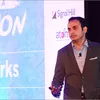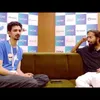[Techie Tuesday] How a small-town boy went on to help Nandan Nilekani build IndiaStack
Our techie this week is Nikhil Kumar, a secret warrior at IndiaStack who helped make UPI a reality. Speaking to YourStory, the young engineer speaks of his work so far and the invaluable inputs Nandan Nilekani provided as a mentor.
"The legacy definition of engineering only referred to building and constructing structures out of abstract patterns, which was considered 'hi-tech' at the time. Today, as technology is being commoditised, the focus is now on elements like design and aesthetics."
This is something Lalitesh Katragadda, the former Country Head of Google India Products, and a fellow at IndiaStack, told a confused Nikhil Kumar, Co-founder and Chief Evangelist of Setu, a few years ago.
The latter applied it to his own work, which led him to envision a line of products that would eventually transform the way India interacted with the internet. Along the way, he discovered the power of co-creation in technology, and how it leads to building large tech ecosystems.

Setu, which is the brainchild of Nikhil’s and Sahil Kini, the former Principal Investor at Aspada Investments, now builds a low-cost API infrastructure to help businesses go live with financial products in a matter of days.
In this week’s Techie Tuesday column, we trace the young engineer’s path from a small town to working on developing APIs for India’s ambitious digitisation efforts.
Not your stereotypical engineer
Twenty-nine-year-old Nikhil was born in Kolar, a small town 60 km from Bengaluru. He comes from a multi-generational engineer family: his grandfather, a civil engineer, was a key architect at the Narmada River Valley project in the 60s. One uncle built the Kudremukh Iron Ore Company while the other is an engineer at PwD in Mumbai. Eleven of his 13 cousins are engineers, who took the typical road today - an engineering degree in India and an MS in the US. So it wasn’t a surprise when Nikhil went down the same path himself, despite his parents being bankers.
Over the years, Nikhil has come to be known not just for his expertise in code, but his knack for going after problems until they are resolved. He calls it the “art of creation” – the ability to find patterns to further define the problems clearly, and then find solutions for it.

A self-proclaimed contrarian, Nikhil says he is more of a technology architect than a developer.
"When you are a coder, you own a small part of the solution. I enjoy myself more while defining the problem, and owning the complete problem myself. I choose solving the full problem versus writing some code and solving a small part," he tells YourStory.
After the initial years in Kolar, Nikhil was sent to a Mysuru boarding school for Class VIII, and thereon began his formative years. He started a club for computer programming and built a few flash games with his peers. He even built a voter application system so that the entire school can vote digitally.
Later, after completing Classes XI and XII in Bengaluru, he chose Electronics and Instrumentation engineering at Siddaganga Institute of Technology, an affiliate to Visvesvaraya Technological University, in Tumkur.
"Looking back on my time at engineering college, I had a lot of fun. Academically, I was an average student but I signed up for the robotics club, fests, and quizzes. However, while the goal for good placement was always there, I was clear that I did not want to sit at a terminal, writing code," Nikhil recalls.
After graduation, he got placed at Tally Solutions.
Tryst with finance sector
After multiple rounds of interviews, Nikhil told the ERP software company’s CTO that he wanted to do anything but just code.
One thing led to another, and the young graduate was managing strategic alliances at Tally. This entailed building customer relationships by working on relevant products. Nikhil’s first solution was to build an e-banking system for customers within Tally.

Nikhil with his family.
What followed was an intrapreneurial experience where he was able to strike a chord between Tally's customers and Airtel broadband. Despite being a desktop-licensed product, Tally became a SaaS product after it was bundled with a broadband connection for over 10,000 of its users. This exposure led to Nikhil’s drive to build more such products that solved a problem end-to-end.
When he felt he had learnt all that he could at Tally, Nikhil wanted to move on to a multinational to extend his learning. But applications to companies like Google and Facebook were met with only rejections.
"I think I was overqualified, given all the things I had done at Tally, but underqualified for these tech giants for I did not have an MBA. It was a six-month process of applying for more than 60 jobs but getting zero callback," he adds.
He finally got a break with Intuit, the California-based financial software company. So, after working for three years at Tally from 2011 to 2014, Nikhil joined Intuit at Bengaluru and got firsthand experience at building a go-to-market strategy for the company's APIs. A role that was specifically created for him, he says.
It was an altogether new experience for Nikhil, as he had the opportunity to strategise ways to create value for Intuit's Indian and global customers.
The API economy
The developer world, which had hitherto revolved only around basic framework, was starting to see change around 2014. As the startup frenzy hit the country, more and more tech companies were committing to open APIs. Android led the pack saying it is going to expose and build more developer ecosystems.
"Android truly showed what a world-class developer ecosystem should look like. A bunch of API-led businesses were kicking off at the time, creating the so-called API economy," Nikhil says.
And the engineer was itching to do more. He was hitting a plateau at Intuit. So, whilst still there, Nikhil built Voyce, a customer feedback platform for SMEs.
With 20 paying customers and a runtime of only 10 months, cloud telephony startup Exotel acquihired Voyce in November 2015.

A trip to Manali.
Nikhil then helped Exotel launch operations in Singapore and enter the Southeast Asia market, which now is one of the fastest growing markets for the startup.
The wake-up call
At this juncture, Nikhil was in a state of confusion. He was immersed in the world of APIs, but had no clear direction.
"There will be times in life when someone comes along to give you a wake-up call, and get you out of your shell. I had one such friend in Ashish Tulsian, the Co-founder of Posist."
Ashish helped Nikhil identify his potential and showed him how he could do a lot more than what he was doing back then. He explained that through Voyce, he was only solving a tiny problem in the whole spectrum, despite being around scalable products and business models at Tally and Intuit.

At Stanford University.
After working at Exotel for a year to ensure his bills were taken care of, Nikhil and his team shut down Voyce and left Exotel.
Working on India’s digital story
It was the year 2016. The government had just started to push the Digital India narrative, and think-tanks like iSPIRT Foundation were aggressively pitching to make India a product nation.
While still at Exotel, a YourStory invite got Nikhil into a Startup India conference in Delhi, where he had a chance to meet iSPIRT Foundation’s Sharad Sharma. The conversation veered towards cloud telephony and Nikhil expressed interest in volunteering for the organisation.
A few days later, he was extended an invite from the foundation to work on the GST network (GSTN), for which the Ministry of Finance needed some help. Nikhil had to build a developer ecosystem for GSTN, and thus began his journey at IndiaStack. The thought of building a developer network at a national level and solving for India greatly excited him.

With Nandan Nilekani during iSPIRT days.
Nikhil went on to organise a Unified Payments Interface (UPI) hackathon and worked closely with the Telecom Regulatory Authority of India (TRAI) to conduct another hackathon to check the end-user experience and build solutions for the same.
Late 2016 saw the demonetisation drive kicking in, when Nikhil was working with Juspay to conceptualise and build BHIM. While building UPI involved more than 2,000 developers, the developer ecosystem, led by Nikhil, worked closely with fintech players like Paytm, Freecharge, Razorpay, PhonePe, and Google Pay, and was on a constant feedback loop with them.
"It was evident that UPI was not built for the banks but essentially for the ecosystem to grow. It was really important to be close with them. It was truly a phenomenon of co-creation but not something that was imposed on them," Nikhil explains.
Reimagining evangelism
Soon enough, he started to write product specifications and rulebooks for several other digital initiatives at IndiaStack; digitising railway stations, ticketing centres, archeological sites and tourist centres, LPG and petrol stations were on the cards.
At the moment, apart from working on Setu, Nikhil is also contributing to Wifi Access Network Interface (WANI), the ambitious project of building a public WiFi system for India. There was already some experimenting going on in collaboration with Google Fibre and Facebook, which are also attempting to pilot for the project.
In the process, he met Nandan Nilekani and has been under his mentorship since.
Right now, the man is on a mission to enable an ecosystem of innovators to build for Bharat, using IndiaStack APIs like Aadhaar, eKYC, eSign, UPI, and Digital Locker.
"So, the playbook was pretty simple: you build a cohort of companies with active developer ecosystems, build valuable and usable APIs, get the developers to work with you, and evangelise these communities to reach customer success. Then there are network effects," Nikhil says.
Nandan Nilekani's advice
After Sahil and Nikhil got together with an idea to build Setu, they went a step further to reimagine the concept of ‘co-creation between developers and financial institutions’. At a TedX talk, Nikhil summarises that all hard problems cannot be broken down and solved by just one person, and that is where co-creation becomes important.
He talks of a systematic way to unbundle and create a playground where policy, platform, and APIs come together and solve the real problems of India with technology. But while all the work he had done at iSPIRT brought much satisfaction and progress, it was on a voluntary basis and without much personal gain.
Nikhil wanted to figure out a way to monetise this mechanism between developers and existing financial institutions. This, essentially, became the backbone of Setu's philosophy.

Nikhil with Sahil Kini.
When Sahil and Nikhil approached Nandan with the idea, he recommended that they do not make Setu out to be a platform where developers build something and then move on to their next problem.
"He told us, ‘Build something that is self-sustainable for the long term, so that you wouldn't have to come back and look for continuity’,” Nikhil recalls.
The duo has been working on Setu for the last year and a half.
While signing off, Nikhil briefly touches upon on family and the important role they play in an individual’s success. He lost his mother to cancer a few months ago, and says he attributes all of his success and the passion to her. “None of this would have been possible without her,” he adds.
(Edited by Evelyn Ratnakumar)


![[Techie Tuesday] How a small-town boy went on to help Nandan Nilekani build IndiaStack](https://images.yourstory.com/cs/2/730b50702d6c11e9aa979329348d4c3e/techietuesday800x4001575886432210png?mode=crop&crop=faces&ar=2%3A1&format=auto&w=1920&q=75)


![[YS Exclusive] Nandan Nilekani on how Aadhaar, UPI, account aggregator can be India’s big contributions to the world](https://images.yourstory.com/cs/2/01f48b20d5e911e899be731e1ddbc52d/WhatsAppImage20190919at5156889473663735?fm=png&auto=format&h=100&w=100&crop=entropy&fit=crop)






